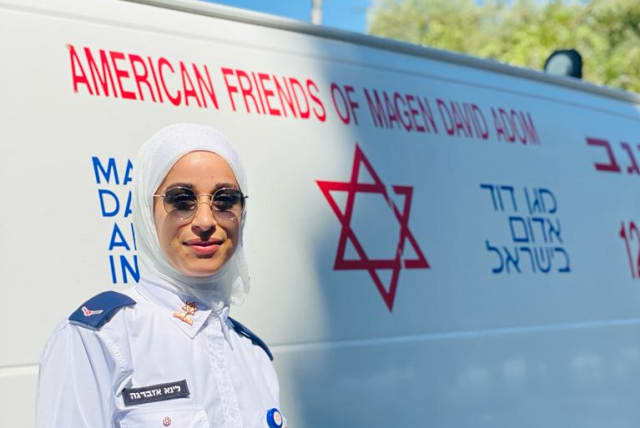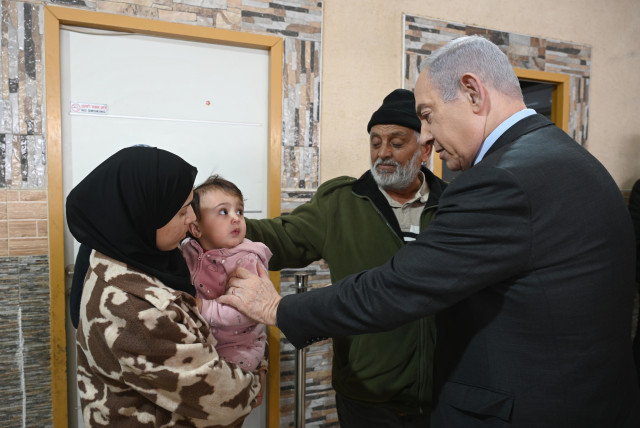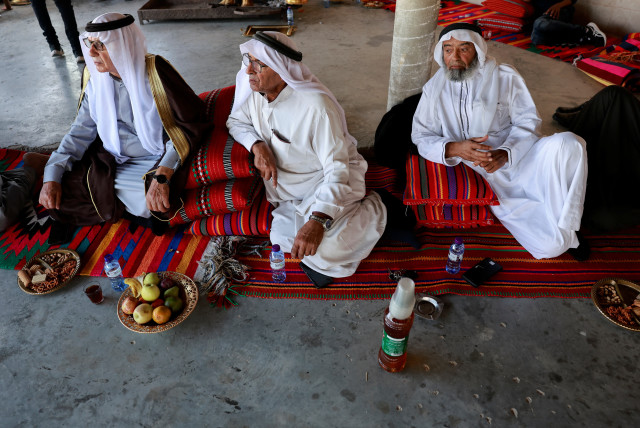Bedouins who fought Hamas on Oct. 7 honored for bravery and heroism in Jerusalem

Israeli politicians vouched for Bedouins who put their lives on the line in order to protect people against Hamas.
Current and former politicians who in previous roles have lived alongside or worked with Bedouin communities, know the Bedouin to be courageous, loyal, excellent soldiers and first-class trackers.
All these qualities have not sufficiently aided their integration into Israeli society, and many are under threat of losing their homes, because their houses or tents are located on what is deemed to be State Land. This is because the land was never registered to a private individual, even though that individual’s family may have lived there for generations.
But after October 7, attitudes toward the Bedouin have changed and the authorities look at them with a less jaundiced eye.
Although military service for members of the Bedouin tribes is not mandatory, more than 1,500 are presently serving in the Israel Defense Forces. Some have been killed while fighting Hamas in Gaza, and some are among the kidnapped hostages languishing in Gaza in the most inhuman conditions.
In other words, the terrorists do not distinguish between Muslim and Jewish Israelis. There should be no distinction, according to Reuven Rivlin, the immediate past president of the State of Israel, who as speaker of the Knesset and as president of the state advocated full integration of all of Israel’s minority communities.
Rivlin was among several public figures who came on Monday to the Friends of Zion Museum in Jerusalem to join in tributes to 13 civilian Bedouin who, without thinking of the risk to their own lives, saved men, women, youths, and small children while being fired at by genocidal Hamas killers. Other public figures included Avi Dichter, minister for Agriculture and Rural Development and former head of the Israel Security Agency; Yossi Peled, a former politician and former head of Northern Command; Alon Schuster, a former minister and former long-time mayor of the Shaar Hanegev Regional Council, and Yuval Turgeman, who is the Ministry of Diaspora Affairs civil administrator in the Negev.
The tribute event was the brainchild of Canadian social activist and philanthropist Avi Benlolo, chairman of the Abraham Global Peace Initiative who organized it together with former MK Ruth Wasserman Lande and Daniel Voicek, the executive manager of FOZ.
Rivlin, who during his service in the IDF, had worked with the Bedouins, could vouch for their heroism, hospitality and selflessness.
The key activities of the Abraham Global Peace Initiative consist of fighting antisemitism and BDS. Aware of this, Rivlin devoted part of his address to the subject, saying: “Freedom of speech does not mean freedom of incitement.” Elaborating on this, Rivlin said that when people make antisemitic remarks or deny the Holocaust, “that is not freedom of speech.”
Turning to the Bedouin, he said that they are the best soldiers, and although they are a tribe and not a nation, more must be done to integrate them into Israeli society, where they can be Israeli citizens and Bedouin by their traditions. He insisted that the territorial problems of the Bedouin communities must be resolved, and noted that they could have been resolved almost 20 years ago, had Ariel Sharon not impeded the implementation of recommendations regarding unrecognized Bedouin villages that had been put forward by the Goldberg Commission.
Today, Rivlin emphasized, the Bedouin are the pride of Israel.
Quoting the biblical selfless expression “Hineni” (Here I am), signifying willingness to serve regardless of personal risk, Voicek said that on October 7 many Bedouin had demonstrated the Hineni concept.
An incredible story of bravery
Benlolo said that he came to Israel soon after the October 7 massacre, because there was so much distortion, denial, and complicity outside of Israel, that he wanted to document what he saw and heard in Israel. He spoke to people from all walks of life who had been directly or indirectly affected by what had taken place on October 7 and had seen what Hamas had done.
In the course of meetings with soldiers, families of hostages, people who had been evacuated from their homes, and others, he came across the Bedouin, and realized that theirs was an incredible story of bravery and heroism “that the world doesn’t know and doesn’t want to know about people from different backgrounds and faiths who want to live and work together.”
He felt that this is a story that must be told when fighting antisemitism and defending Israel.
Dichter, punctuating his Hebrew with comments in Arabic and English, and quoting from the Quran, said that people were created differently, not to live in isolation from each other, but to understand each other.
No one, including the Bedouin themselves, knows exactly how many people they saved – although they saved many. But they didn’t count how many, or ask for the names and ID cards of the people they rescued, he said. They just kept on doing it.
Turgeman said that a memorial center for the Bedouin will be built in which heroes both military and civilian will be honored.
Not all the Bedouin heroes came to claim the statuettes awarded for bravery and heroism inscribed with their names. One couldn’t come because he had been killed during rescue operations. These 13 acknowledgments of heroism were only symbolic of the civilian heroes of their communities.
The best-known are the members of the Alkanawi family – Sary, Asmael, Dahesh, Hammed, and Rafi. Other recipients were Mohammed Abu Najah, Shariff Al Hezeri, Masad Ramtel, Amar Absbilla, Yosef Aziadna, Shleba Sleman, Ramo Salmn El-Hazayil and Anis Abu m Dabes.
Also present to help distribute the statuettes, but to receive one because he is not Bedouin, was Oz Davidian, who on October 7, saved 120 people.
Peled, who is also chairman of FOZ, said that when he was head of Northern Command, he realized that there was no difference between him and the Bedouin when he and a group of Bedouin soldiers sat down together for coffee. The coffee that was served was Nescafe.
Jerusalem Post Store
`; document.getElementById("linkPremium").innerHTML = cont; var divWithLink = document.getElementById("premium-link"); if (divWithLink !== null && divWithLink !== 'undefined') { divWithLink.style.border = "solid 1px #cb0f3e"; divWithLink.style.textAlign = "center"; divWithLink.style.marginBottom = "15px"; divWithLink.style.marginTop = "15px"; divWithLink.style.width = "100%"; divWithLink.style.backgroundColor = "#122952"; divWithLink.style.color = "#ffffff"; divWithLink.style.lineHeight = "1.5"; } } (function (v, i) { });


